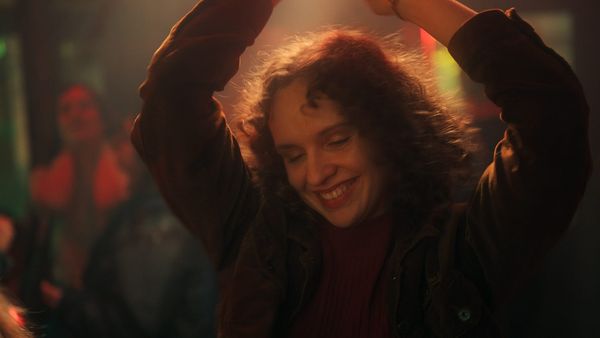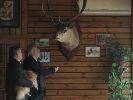Eye For Film >> Movies >> Feature Film About Life (2021) Film Review
Feature Film About Life
Reviewed by: Amber Wilkinson

Although the plot of Dovile Sarutyte's debut feature is driven by a death it more than lives up to its title, celebrating life in all its messy detail - sometimes much less inconsequential than it first appears - that many films prefer to streamline.
Sarutyte's film is a celebration of dancing when the mood takes you, of snatced childhod memories - using home video footage shot by her own dad when she was a girl - of cheering yourself up by the goofy use of face cream and, most importantly, about all the little ways that family bonds manifest themselves when faced with grief.

Dovile (Agne Misiunaite) doesn't know grief is coming for her as she dances on a night out with friends on a trip to France. Sarutyte lets these handful of moments play out with a naturalistic grace that runs through the film, as the women note that for all that this is a great adventure "we're actually doing the same thing as our parents".
Back in Lithuania, the news comes of her father's death, which sets in motion the usual rituals - dealing with the body, deciding on burial or cremation, finding a place to hold a wake. She does this with the help of her mum (Nelė Savičenko) and an old family friend Tadas (Kestutis Jakstas) but for all that there are motions to go through, Sarutyte emphasises the way that 'regular' life also continues, intruding in unexpected ways. There are incidental absurdities, such as the flirtatious funeral parlour boss who, it turns out, was once Tadas' secretary, not to mention the selection of the over-priced burial suit. Alongside this, are the signs of the ties that bind, such as when her mum realised, on production of a lighter, that her daughter is smoking - something that is, in many ways, just as important as the ritual the pair of them are going through at the time. Nothing here is compartmentalised, with moments of humour and sadness running like rivulets over one another.
Sarutyte isn't scared to let these emotions come to the fore - sometimes explosively - but she has a light touch, so that we feel as though we are experiencing Dovile's grief rather than simply being shown it. Generational tensions and expectations are also explored and you can feel Sarutyte's care for all of her characters, each lovingly crafted, no matter how small. Dovile's emotions are underscored by the use of the home video, which bubbles up periodically, like a snatched memory, as Dovile herself considers her relationship with her dad. "What do you see?" the childhood Dovile asks her dad as he points the camera at her. Sarutyte asks us the same, while showing us the complexity of the answer.
Reviewed on: 29 Mar 2022














